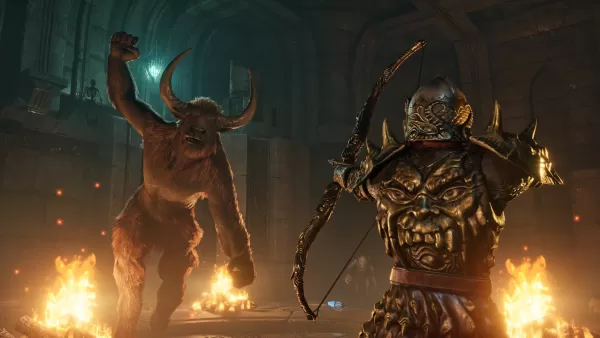When Bethesda unveiled Oblivion Remastered earlier this week, I was astounded. The 2006 journey to Tamriel, once characterized by its quirky, potato-faced characters and blurry, low-resolution landscapes, has now transformed into the most visually stunning Elder Scrolls game to date. Having been conditioned by a series of underwhelming HD remasters like Mass Effect Legendary Edition and Dark Souls Remastered, which barely differ from their Xbox 360 counterparts, seeing the Imperial City I explored nearly two decades ago rendered in Unreal Engine 5 with ray tracing was a revelation. Moreover, the game has been enhanced with significant upgrades to combat, RPG systems, and numerous other details. This led me to question whether Bethesda and the project's developer, Virtuos, had misnamed it. Shouldn't this be Oblivion Remake rather than remastered?
It turns out I wasn't the only one with this thought. Many fans have labeled it a remake, and even Bruce Nesmith, the senior game designer of the original Oblivion, remarked, "I'm not sure [the word] remaster actually does it justice." Initially skeptical of the remaster label, after spending several hours with the game, it became clear to me that Oblivion Remastered may look like a remake but fundamentally plays like a remaster.
The reasons Oblivion appears as a remake are straightforward: Virtuos has undertaken extensive work, redesigning "every single asset from scratch." Visually, everything you see on screen is brand new—from trees and swords to crumbling castles. This overhaul ensures Oblivion meets modern graphical standards, boasting beautifully textured environments, stunning lighting, and a new physics system that realistically impacts the game world with every arrow and weapon strike. While the NPCs are the same characters from 2006, their models have been entirely recreated. This impressive transformation aims not to merely replicate the game as remembered but to elevate it to meet 2025's visual expectations. If I had seen this before the remaster rumors, I might have mistaken it for The Elder Scrolls 6.
Beyond visuals, the gameplay has seen significant enhancements. Combat feels more responsive, with longsword swings no longer resembling balloon fencing. The third-person camera now includes a functional reticule, and all menus, from the quest journal to dialogue and minigames like lockpicking and persuasion, have been refreshed. The original, problematic leveling system has been replaced with a more intuitive hybrid of Oblivion and Skyrim's approaches. Additionally, players can now sprint. With such extensive visual and gameplay upgrades, it's tempting to categorize this as a remake.
However, the distinction between remakes and remasters remains murky. There are no industry-standard definitions, and publishers often use these terms loosely. For instance, Rockstar's "Definitive Edition" remasters of the Grand Theft Auto trilogy retain their blocky PlayStation 2-era look with merely upscaled textures and modern lighting. In contrast, the Crash Bandicoot N. Sane Trilogy, also called a remaster, features entirely new graphical assets and appears modern. Remakes like Bluepoint's Shadow of the Colossus and Demon's Souls rebuild games from the ground up but remain faithful to the originals, while Resident Evil 2 redesigns gameplay while sticking to the original structure. Final Fantasy 7 Remake and Rebirth radically alter design, script, and story. These examples illustrate the lack of a unified philosophy in defining remakes.
Historically, a game rebuilt from scratch in a modern engine was considered a remake, while remasters were limited upgrades within the original technology. This definition is becoming outdated. A more fitting modern definition might classify a remaster as a graphical overhaul that preserves the original game's design with minor quality-of-life improvements, while a remake redesigns the game entirely. Under this definition, Demon's Souls and Metal Gear Solid: Delta would be considered remasters, reserving the term "remake" for games that offer new interpretations of old ideas.

So, is the new version of Oblivion a remake or a remaster? After playing it, it's evident that Oblivion Remastered is aptly named. While the new assets and Unreal Engine 5 ray tracing make it look brand new, the core gameplay and structure remain rooted in the 20-year-old original. As Bethesda explained, "We looked at every part and carefully upgraded it. But most of all, we never wanted to change the core. It's still a game from a previous era and should feel like one."
The hallmarks of that era are evident in the loading screens behind every door, the perplexing persuasion minigame, the simplistic city designs, the awkward NPC movements and dialogue, the still somewhat clunky combat, and the preserved bugs and glitches that add to the original's quirky charm.
Recent games like Obsidian's Avowed showcase modern advancements in combat and exploration, making Oblivion Remastered feel like a relic. Yet, the magic of Oblivion's world remains vibrant, with its open fields full of mysteries and its ambitious features like dynamic goblin wars and engaging quest structures. While its old-school approach to player freedom feels refreshing, the game's granular details reveal its age. A true remake would update these elements, but Oblivion Remastered is about reliving the past.
Video games often borrow terminology from other media. In film, remakes are new productions with new casts, crews, scripts, and sets, while remasters enhance existing films to meet modern quality standards. Classic films like Jaws and The Godfather in 4K look incredible but remain products of their time. Similarly, Oblivion is like a high-definition restoration of a classic film, pushing visual quality to its limits by recreating its "exterior" in a new engine. Yet, beneath this, it remains a product of the 2000s. As Alex Murphy, executive producer at Virtuos, aptly put it during the reveal stream, "We think of the Oblivion game engine as the brain and Unreal 5 as the body. The brain drives all the world logic and gameplay and the body brings to life the experience that players have loved for almost 20 years."
Oblivion Remastered is precisely what it claims to be, and its achievements should not be underestimated. Rather than insisting it's a remake, we should use it as the benchmark for remasters from other major AAA companies. This is the standard that Mass Effect Legendary Edition and Grand Theft Auto: The Trilogy should have met. Oblivion Remastered is a labor of love, looking like a remake crafted by passionate hands but playing like a remaster preserved by devoted fans, and that's exactly how it should be.















